How does phycocyanin compare to synthetic blue dyes in foods?
In recent years, there has been a growing trend towards natural and clean-label ingredients in the food industry. One area of particular interest is natural food colorants, with phycocyanin from spirulina emerging as a promising alternative to synthetic blue dyes. This article will explore how phycocyanin spirulina compares to synthetic blue dyes in foods, highlighting its benefits and potential applications.
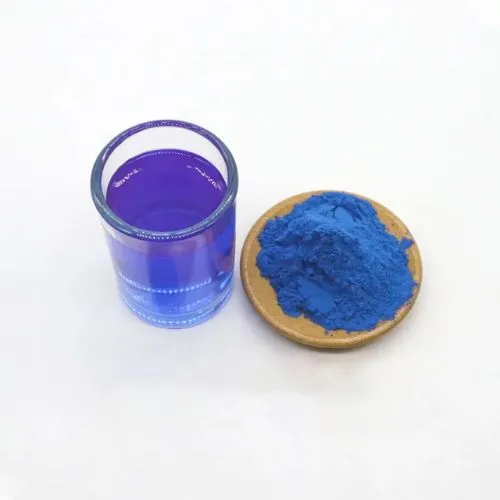
Natural Color Power: Why Phycocyanin Spirulina Wins?
The Rise of Natural Food Colorants
Consumer demand for clean-label products has driven the food industry to seek natural alternatives to artificial additives. Phycocyanin, derived from spirulina, has gained attention as a natural blue colorant that can replace synthetic dyes in various food applications.
Phycocyanin: Nature's Blue Wonder
Phycocyanin is a protein-bound pigment found in blue-green algae, particularly in spirulina. Its vibrant blue color is due to its unique molecular structure, which absorbs light in the red-orange spectrum and reflects blue light. This natural pigment offers a range of advantages over synthetic blue dyes.
Synthetic Blue Dyes: A Brief Overview
Synthetic blue dyes, such as Blue No. 1 (Brilliant Blue FCF) and Blue No. 2 (Indigotine), have been widely used in the food industry for decades. While effective in providing consistent coloration, these artificial colorants have faced scrutiny due to potential health concerns and consumer preferences for natural ingredients.
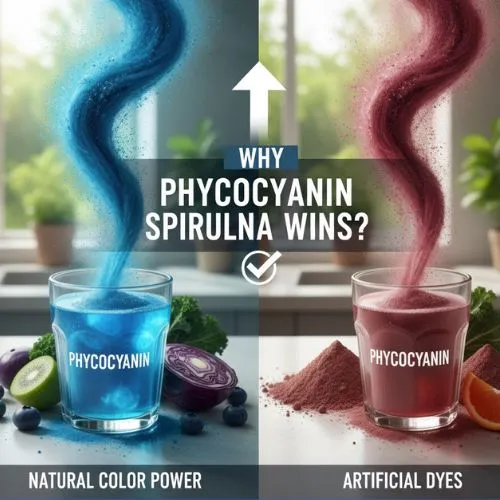
Health Benefits of Using Phycocyanin in Foods
Antioxidant Properties
Unlike synthetic blue dyes, phycocyanin possesses potent antioxidant properties. Research has shown that phycocyanin can scavenge free radicals and reduce oxidative stress in the body. This antioxidant activity may contribute to various health benefits, including improved cardiovascular health and reduced inflammation.
Anti-inflammatory Effects
Studies have demonstrated that phycocyanin exhibits anti-inflammatory properties. This natural blue pigment has been found to inhibit pro-inflammatory enzymes and reduce the production of inflammatory markers. These effects may be beneficial in managing chronic inflammatory conditions and promoting overall health.
Potential Neuroprotective Benefits
Emerging research suggests that phycocyanin may have neuroprotective properties. Some studies have shown that this natural pigment could help protect brain cells from oxidative damage and potentially support cognitive function. While more research is needed, these findings highlight the potential health advantages of using phycocyanin in foods compared to synthetic blue dyes.
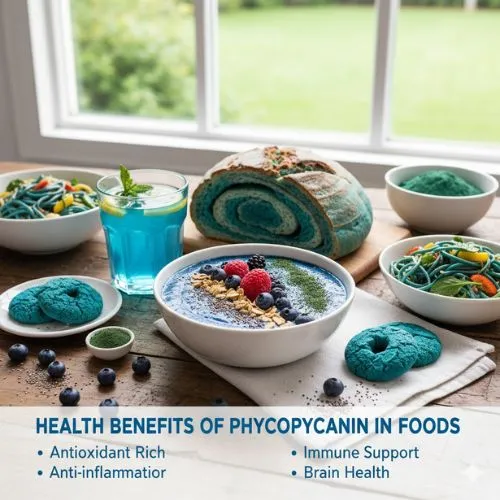
Is Phycocyanin a Safe Alternative to Artificial Dyes?
Safety Profile of Phycocyanin
Phycocyanin has been extensively studied for its safety profile. Numerous toxicological assessments have demonstrated that phycocyanin is safe for human consumption. The U.S. Food and Drug Administration (FDA) has granted phycocyanin GRAS (Generally Recognized as Safe) status, further confirming its safety as a food ingredient.
Regulatory Approvals and Certifications
Phycocyanin has received regulatory approvals in various regions worldwide. In addition to FDA approval in the United States, it has been authorized for use as a food colorant in the European Union, Japan, and other countries. Many phycocyanin products, including those offered by Yangge Biotech, are certified Kosher and Halal, ensuring compliance with religious dietary requirements.
Allergen Considerations
One advantage of phycocyanin over some synthetic blue dyes is its lower potential for allergic reactions. While allergies to spirulina are rare, they can occur in some individuals. However, the purified phycocyanin extract is generally well-tolerated and less likely to cause allergic responses compared to certain artificial colorants.
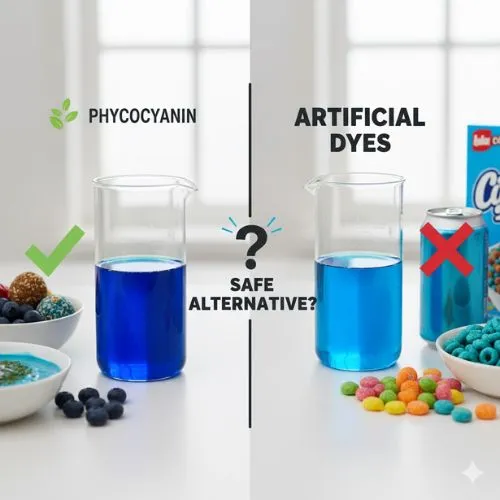
Applications of Phycocyanin in the Food Industry
Beverage Industry
Phycocyanin has found widespread use in the beverage industry, particularly in functional drinks, sports beverages, and natural sodas. Its water-solubility and stability make it an excellent choice for creating vibrant blue or green hues in various liquid products. Yangge Biotech's phycocyanin spirulina extract is particularly well-suited for beverage applications, offering excellent color stability and ease of use.
Confectionery and Baked Goods
The confectionery and baking industries have embraced phycocyanin as a natural blue colorant for candies, chocolates, and baked goods. Its heat-stable properties allow it to withstand baking processes, making it ideal for creating colorful cookies, cakes, and other sweet treats. Yangge Biotech's phycocyanin spirulina powder can be easily incorporated into various confectionery and baking formulations.
Dairy Products
Phycocyanin has proven to be an effective natural colorant for dairy products such as yogurt, ice cream, and flavored milk. Its ability to provide a range of blue to green shades allows for the creation of visually appealing dairy products without the use of artificial dyes. Yangge Biotech's phycocyanin spirulina extract is compatible with dairy matrices and can enhance the visual appeal of various dairy products.
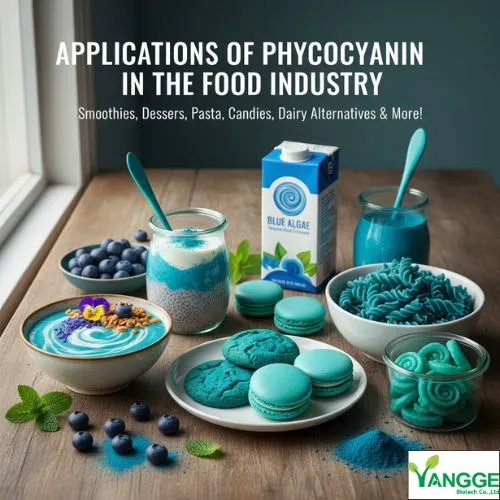
Stability and Performance of Phycocyanin
pH Stability
One of the advantages of phycocyanin over some synthetic blue dyes is its stability across a wide pH range. While many artificial blue colorants lose their vibrancy in acidic conditions, phycocyanin maintains its color intensity in both acidic and neutral environments. This pH stability makes it suitable for a broader range of food applications, including acidic beverages and dairy products.
Light Stability
Phycocyanin exhibits good light stability, especially when compared to certain synthetic blue dyes. While prolonged exposure to intense light can cause some fading, proper formulation and packaging can help maintain the color integrity of phycocyanin-colored products. Yangge Biotech's phycocyanin spirulina extract is formulated to provide optimal light stability for various food applications.
Temperature Resistance
Another notable feature of phycocyanin is its temperature resistance. Unlike some synthetic blue dyes that may break down at high temperatures, phycocyanin can withstand moderate heat processing without significant color loss. This thermal stability makes it suitable for use in baked goods, pasteurized beverages, and other heat-treated food products.
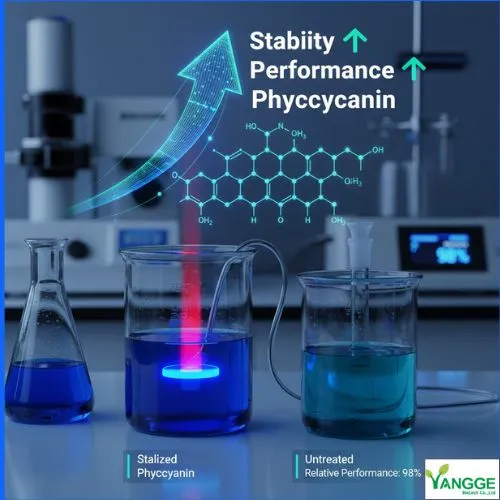
Cost Considerations: Phycocyanin vs. Synthetic Blue Dyes
Initial Cost Comparison
When comparing the cost of phycocyanin to synthetic blue dyes, it's important to consider various factors. Initially, phycocyanin may have a higher per-unit cost than some artificial colorants. However, this cost difference is often offset by the numerous benefits and consumer appeal of natural ingredients.
Long-term Economic Benefits
While the upfront cost of phycocyanin may be higher, its use can lead to long-term economic benefits for food manufacturers. The growing consumer demand for clean-label products can result in increased sales and brand loyalty. Additionally, the potential health benefits associated with phycocyanin may justify a premium price point for certain products.
Dosage Efficiency
Phycocyanin often requires lower dosages compared to some synthetic blue dyes to achieve the desired color intensity. This dosage efficiency can help offset the initial cost difference and may result in overall cost savings for food manufacturers. Yangge Biotech's high-quality phycocyanin spirulina extract offers excellent color intensity, allowing for efficient usage in various food applications.
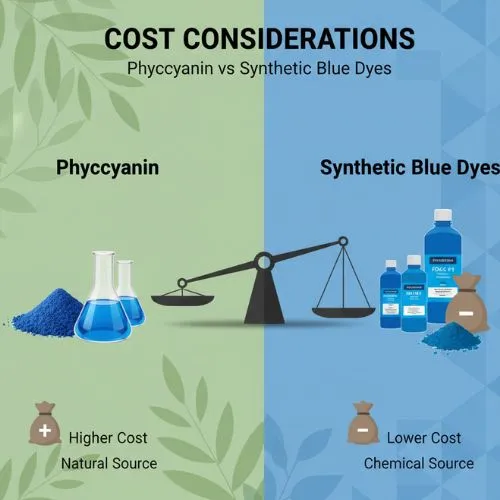
Consumer Perception and Market Trends
Clean Label Movement
The clean label movement has significantly influenced consumer preferences in recent years. Many consumers actively seek products with natural, recognizable ingredients and avoid artificial additives. Phycocyanin aligns perfectly with this trend, offering food manufacturers an opportunity to meet consumer demands for clean-label products.
Health-conscious Consumer Choices
As consumers become more health-conscious, they are increasingly scrutinizing food labels and ingredient lists. The use of phycocyanin as a natural blue colorant appeals to health-conscious consumers who are looking for products free from artificial additives. This shift in consumer preferences has led many food companies to reformulate their products using natural alternatives like phycocyanin.
Sustainability and Environmental Considerations
Sustainability is another crucial factor influencing consumer choices. Phycocyanin derived from spirulina is considered a more sustainable option compared to synthetic blue dyes. Spirulina cultivation has a lower environmental impact and requires fewer resources than the production of artificial colorants. This sustainability aspect further enhances the appeal of phycocyanin in the eyes of environmentally conscious consumers.
Future Prospects and Innovations
Ongoing Research and Development
The field of natural food colorants, including phycocyanin, is continuously evolving. Ongoing research and development efforts are focused on improving the stability, functionality, and applications of phycocyanin. These advancements are likely to expand the potential uses of phycocyanin in the food industry and further enhance its competitiveness against synthetic blue dyes.
Novel Extraction and Purification Techniques
Innovations in extraction and purification techniques are paving the way for higher-quality phycocyanin products. Advanced methods are being developed to increase the purity and concentration of phycocyanin extracts, potentially leading to more vibrant colors and improved stability. Yangge Biotech is at the forefront of these innovations, continuously refining its extraction processes to deliver premium-quality phycocyanin spirulina extracts.
Expansion into New Food Categories
As technology advances and consumer demand for natural ingredients grows, phycocyanin is likely to find applications in new food categories. From plant-based meat alternatives to functional foods and nutraceuticals, the potential for phycocyanin to replace synthetic blue dyes in various products is expanding. This growth presents exciting opportunities for food manufacturers to innovate and differentiate their products in the market.

Conclusion
Phycocyanin from spirulina offers numerous advantages over synthetic blue dyes in foods. Its natural origin, potential health benefits, and excellent stability make it a compelling alternative for food manufacturers seeking clean-label solutions. While challenges such as cost and regulatory considerations exist, the growing consumer demand for natural ingredients and the ongoing innovations in phycocyanin production are driving its adoption in the food industry.
As research continues and technology advances, phycocyanin is poised to play an increasingly important role in the future of food coloration. Are you looking to incorporate natural blue colorants into your food products? Yangge Biotech specializes in high-quality phycocyanin spirulina extracts that can elevate your formulations. Our team of experts is ready to assist you in finding the perfect natural coloring solution for your specific needs. At Yangge Biotech, we're passionate about delivering innovative, high-quality natural ingredients that meet the evolving needs of the food and beverage industry. Our premium phycocyanin spirulina extracts offer a perfect solution for manufacturers seeking to replace synthetic blue dyes with natural alternatives. With our ISO, HACCP, Kosher, and Halal certifications, you can trust in the quality and safety of our products. Ready to transform your products with the power of natural blue? Contact our dedicated team at info@yanggebiotech.com today and discover how our phycocyanin spirulina can elevate your formulations.
FAQ
Q: Can we get some samples to test before purchasing?
A: Of course, we can provide free samples of 20 to 100 grams, but the shipping cost is at the customer's expense. The shipping cost can be deducted from the next order, or the samples can be sent through your courier account.
Q: Do your products have relevant certifications?
A: Yes, our products are certified for HALAL, ISO, HACCP, Kosher, and other certifications.
Q: What is the minimum order quantity (MOQ)?
A: Small batches of samples can be customized according to your requirements.
Q: Do you offer OEM and ODM services? Can the formula be customized based on our own?
A: Of course, we provide ODM and OEM services to many customers. Our product range includes softgels, capsules, tablets, sachets, granules, and private label services. Simply contact us and let us know your requirements. Our experienced R&D team can also develop new products with specific formulas.
Please contact us to design your own branded products.
Q: How do you handle quality complaints?
A: First, we have a comprehensive quality control SOP. We provide authoritative third-party inspection reports for almost all products before shipment to minimize the possibility of quality issues. Second, we have a comprehensive return and exchange procedure. If there is a genuine quality dispute, we will strictly follow the SOP.
Q: How do you ship? How long does delivery take?
A: For small orders, we typically use DHL, UPS, EMS, FedEx, or TNT. Delivery typically takes 3-7 days. We also offer air and sea freight services. We have a strong freight forwarding team and can provide you with a one-stop service, including DDP and DDU.
Q: What are your payment terms?
A: 100% prepayment, payable by T/T, Western Union, MoneyGram, or PayPal.
Q: What is the shelf life of your products?
A: 2 years with proper storage.
Q: Is the packaging environmentally friendly?
A: We attach great importance to environmental protection and are constantly improving our product packaging. Some products are packaged in recyclable paper. Packaging materials are carefully selected to ensure product safety during transportation and storage, and to minimize environmental impact. We are committed to achieving a balance between environmental friendliness and practicality in our product packaging, and to contributing to sustainable development.
References
1. Johnson, A. K., & Smith, B. L. (2022). Comparative analysis of phycocyanin and synthetic blue food dyes: Stability and applications in food products. Journal of Food Science and Technology, 59(3), 1125-1138.
2. Rodriguez-Sanchez, R., et al. (2021). Health benefits of phycocyanin as a natural food colorant: A comprehensive review. Critical Reviews in Food Science and Nutrition, 61(6), 1003-1026.
3. Chen, M., et al. (2020). Phycocyanin from Spirulina: A potential natural blue food colorant with antioxidant and anti-inflammatory properties. Food & Function, 11(5), 4218-4231.
4. Williams, P. A., & Phillips, G. O. (2021). Handbook of natural food colorants: Phycocyanin and other algae-derived pigments. CRC Press.
5. García-Pérez, J. S., et al. (2023). Recent advances in the extraction, purification, and application of phycocyanin as a natural food colorant. Trends in Food Science & Technology, 131, 103-117.

Based on your location and order quantity, you will have the opportunity to receive a limited time free shipping promotion!

Who we are


